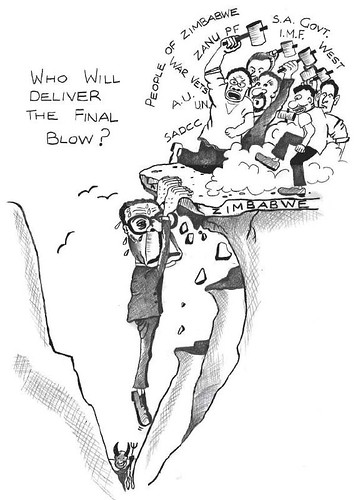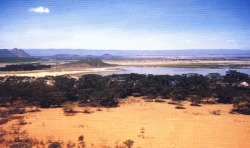
I've been watching the slow dance of the culture wars over the last week or two, turning on the question of attitudes towards homosexuals.
October 12th marked the 10th anniversary of
Wayne Shepard (and
here), lynched in Wyoming for being gay. For some people this has not been a cold war.
Thinking Anglicans has reports from Nigeria of a direct conflict between those for whom
'Homosexuality is totally unacceptable' and the announcement of 'House of Rainbow, purportedly a church organisation piloted by a self-confessed homosexual, Reverend Rowland Jide Macaulay.'

This in a country in which some people have denied the existence of homosexuality, let alone its acceptability. Also: "CHRISTIAN leaders in the South Senatorial district of Delta State have expressed shock at the infiltration into the country of the Gay Movement, made up of homosexuals and lesbians, saying it is a satanic plot"
here.
In Kenya
Revd Michael Kimindu has found himself excluded from his clergy chapter meeting because of his support for those in same-sex relationships. Michael is the Co-ordinator for
Other Sheep Ministries East Africa.
GAFCON met in Uganda. The headline
'Anti-gay bishops meet' was an accurate description.
Across the pond in Califormia a referendum seems to be moving towards rescinding the State's authoriasation of same-sex marriages.
Geoff Farrow, a Roman Catholic Priest, has been suspended by his bishop for publicly supporting same-sex marriage. He has made
a statement to the effect that, although others will stay silent, his conscience would not allow him to do so. In some quarters he has been
hailed as a hero. He is
not alone, but he was the first.
On the other hand the
Connecticut Supreme Court has ruled, albeit by a 4:3 majority, that the ban on same-sex marriage in that state is unconstitutional. The
Supreme Court in California has come to the same conclusion.
In
Norway the bishops debated and decided they would not permit same-sex unions in church, nor bless (heterosexual) civil marriages.
In Iraq "October 2, 2008 - A key figure in the clandestine Baghdad network of theassociation Iraqi lesbian, gay, bisexual, and transgender/transsexual(LGBT) was assassinated by an anti-gay Islamist death squad"
here. Death threats had followed an article and photo in an Australian magazine. Read the whole article.
The Vatican
refuses gay people and divorcees as ambassadors in its court. I guess it does not want to be tainted.
Back in the States the Diocese of Pittsburgh has split down the middle. The majority will follow Bob Schofield into some sort of
affiliation with the Southern Cone; a minority (at least
20 parishes) will
remain with TEC. It'll be a while before its clear what will happen about
Trinity Cathedral. The expectation is that a new diocese will be created in North America round which conservatives will circle their wagons. This has no doubt been spurred a little nearer by the
inhibition of 52 clergy in the Diocese of San Joaquin following its defection from TEC. Perhaps it'll be
ready by Christmas.
A fascinating and sad account of how the Diocese of San Joaquin came to leave TEC and attempts at and failure of reconciliation is
here.
In England the issue was the role of women. John Broadhurst, Bishop of Fulham, said (as reported in the
Daily Telegraph) that the decision not to protect Forward in Faith from women bishops was 'sin' and that 'Synod is "unfit for purpose" because it does not consider God first and added to applause: "The sooner it is trimmed, culled, sorted or even destroyed, the better."' (Ironic really. It took 150 years for the CofE to patriate from Parliament the power to make spiritual decisions in the government of the church. And as soon as it exercises that power people walk off in a huff.) And
Bob Duncan pops up to court conservatives. Does he want English conservatives to be a parish in the new American Province?
At the same time
Reform is speculating out loud about the possibility of aligning itself with bishops outwith the UK. Not forgetting the
chaplain to the Stock Exchange. You wonder about the company he keeps.
================
This post has been just two weeks in the making. I guess you could do a similar review of more or less any fortnight over the last few years.
What I noted first was the violence of words (the Bishop of Fulham, Peter Mullen) and fact (Matthew Shepard, Iraq). I believe there is a direct line (association, not cause) between language which demeans and dehumanises people and willingness (tacit permission) to use violence agains them. The victims of this culture war are those who are made less, who suffer in their lives and careers, who suffered abuse and beatings and death for their sexuality.
There is also a repeated use of minority status, not least the claim for those who suffer violence that they are martyrs, as weapons in the war. Conservatives claim to be victimised by liberals which somehow creates a moral equivalence to those who suffer violence. Each side no doubt diminishes the other, I am prone to do so myself, but I risk the assertion that no-one has yet been murdered or beaten up for being a heterosuxual conservative.
There is something inherent in religion which simultaneously creates the possibility of hope, peace, reconciliation, mutual regard and respect across difference, denies the possibility. (See
Violence in God's Name, Oliver McTernan, DLT, 2003) I believe that the dominant word of religion is violence against the other - often in order to prove (give effect to) the truth of one's own claim by the denial of another. At the same time the model is inverted: the truth of one's own claim is proven (tested) by noble suffering. The model is in
Foxes' Book of Martyrs: Bishop Farrar, for example, was burnt at the stake by Bloody Mary,
it is said that one Richard Jones, a knight's son, coming to Dr. Farrar a little
before his death, seemed to lament the painfulness of the death he had to
suffer; to whom the bishop answered that if he saw him once stir in the pains of
his burning, he might then give no credit to his doctrine; and as he said, so
did he maintain his promise, patiently standing without emotion, until one
Richard Gravell with a staff struck him down.
Or, in Ted Hughes' version ‘If I flinch from the pain of the burning, believe not the doctrine that I have preached.'
Violence - dehumanisation - control of the other - the claim to know truth and to the right to apply it over all other claims - and proof of truth by martyrdom - form a religiously validated complex of ideas played out today over the issue of sexuality.
When it ends, will it just be replaced by another issue, and more people suffer?





























